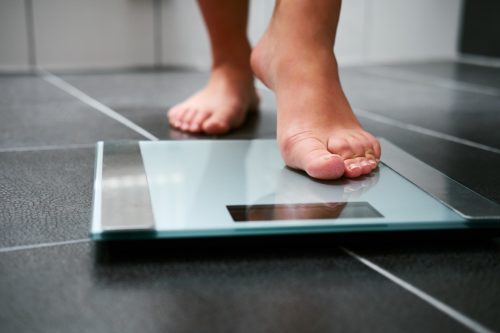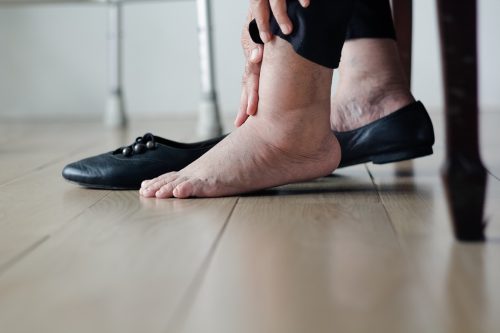What Happens to Your Body If You Sit All Day, According to Doctors

Between working at an office desk, eating meals, and binge-watching Netflix at the end of the day, we spend a lot of time seated. In fact, recent research has shown that Americans are sedentary for an average of 9.5 hours per day. But what happens to your body if you sit all day long? According to doctors, this seemingly harmless habit can be pretty detrimental to your health.
“Our bodies were made to move and by sitting all day, we can stiffen up, which can increase our risk for injuries when we do daily activities or hobbies,” explains Laura Kummerle, PT, DPT, a board-certified doctor of physical therapy with an orthopedic specialty certification. “In addition to increasing the risk of injury, it can negatively impact your blood circulation, heart health, and metabolism.
Danielle Kelvas, MD, a medical advisor at Speediance, recommends getting up and walking around every 30 minutes to an hour in order to avoid these potential health risks. Read on to find out what might happen to your body if you don’t.
READ THIS NEXT: If You Sleep in This Position, You Could Be Hurting Your Spine, Experts Warn.
You may experience stiffness.

“Sitting for long periods can cause increased pressure on certain areas of your body, such as your spine, hips, and buttocks, which can result in discomfort, pain, and stiffness,” says Lalitha McSorley, owner and lead physical therapist at Brentwood Physiotherapy Calgary.
According to Dave Candy, PT, DPT, a board-certified doctor of physical therapy and owner of More 4 Life, stiffness is especially common in the hip flexors and hamstrings after sitting for extended periods.
“Sitting at a computer can also lead to stiffness of your chest, neck, and shoulder muscles,” he adds. “Muscle knots or trigger points can start to develop in as little as one hour of desk work.”
Your heart health might take a hit.

The heart is like any other muscle—if you don’t keep training it, it doesn’t work as well. While standing up and walking around causes your heart to work harder, sitting does the opposite. So, do your ticker a favor and get up once in a while. After all, a 2022 study found that sitting for eight or more hours per day is linked to a 20 percent higher risk of heart disease or dying from any cause, and a 49 percent higher risk of heart failure.
“When you move, it increases your body’s demand for oxygen,” explains Candy. “That means your heart has to work harder and you get the blood circulating through your arteries and to your tissues. As such, moving regularly decreases your risk of heart attack or stroke.”
Your muscles might start to atrophy.

When you sit, you don’t have to use your lower body muscles to hold you up. As a result, these muscles can become weaker over time, says Kelvas. This is known as muscle atrophy.
McSorley notes that sitting for prolonged periods can weaken the muscles in your back, core, hips, and legs. “This can lead to muscle imbalances, where some muscles become overly tight while others become weak, which can disrupt the natural alignment and function of your body, leading to poor posture and potential musculoskeletal issues,” she explains.
For more health advice sent directly to your inbox, sign up for our daily newsletter.
You’ll burn fewer calories.

Non-exercise activity thermogenesis—or NEAT—is the energy your body expends during daily activities. According to Kummerle, sitting all day reduces NEAT and more specifically, how many calories your body burns. If you don’t adjust your calorie intake accordingly, this can result in weight gain over time.
In fact, a Dec. 2012 study found that sitting for more than four hours per day increases your risk of being overweight or obese.
READ THIS NEXT: Doing This for 10 Minutes Twice a Week Spikes Your Metabolism, Doctors Say.
Your back may suffer.

According to Candy, sustained static positions—like sitting in a chair—are bad for your spine. “The discs in your spine don’t get a good blood supply on their own,” he explains. “They get their nutrition from the vertebrae above and below them, and that happens when you move around.”
Prolonged sitting—particularly with an overly slouched posture—can put more pressure on the discs in your lower back, he says. Meanwhile, prolonged sitting in an overly upright posture without back support puts more pressure on the facet joints in your lower back while increasing stiffness in your hip flexors and back extensor muscles. “Neither prolonged slouched sitting nor prolonged upright sitting is good,” Candy tells Best Life.
Less circulation can cause a slew of physical issues.

Sitting for long periods can impair blood flow and circulation in your lower body, says McSorley. This is because your muscles aren’t actively engaged in pumping blood back to your heart.
“This can result in the pooling of blood in your legs—leading to swollen ankles, increased risk of blood clots, and compromised cardiovascular health,” she explains.
Your bone density could decrease.

Prolonged sitting can also negatively affect your bone health. This is an important consideration for those who are age 65 and older—as this is when your body starts to naturally lose bone mass.
“Weight-bearing activities, such as standing and walking, help to stimulate bone growth and density, but sitting reduces the mechanical loading on your bones,” says McSorley. “Over time, this can lead to decreased bone density—which can increase the risk of osteoporosis and fractures.”
Best Life offers the most up-to-date information from top experts, new research, and health agencies, but our content is not meant to be a substitute for professional guidance. If you have specific health questions or concerns, always consult your healthcare provider directly.